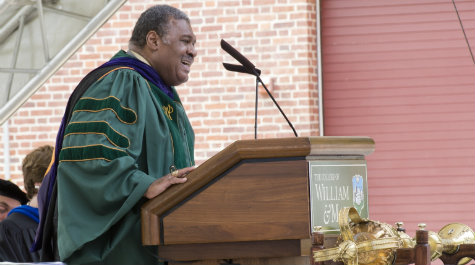Thomas Reminds Graduates That They Are the "Hope of the Law"
Justice John Charles Thomas drew on his experience as a jurist and a lawyer who was born in an era of segregation to inspire the Law School's Class of 2012 to "be great, powerful changers of the law for the good."
Thomas, who at age 32 was the youngest person and the first African-American to be appointed to serve on the Supreme Court of Virginia, said he relished the chance to speak to the 205 J.D. and 28 LL.M. graduates, who were joined by about 1,600 well-wishers for the Law School's graduation ceremony at the Lake Matoaka Amphitheatre on May 13. "I've seen this group before," he said, recalling when he spoke to the J.D. class during their first-year orientation in August, 2009. "They didn't have the green robes and berets ... they were wide eyed and filled with wonder and maybe a little bit of fear about what was to come. It has been a joy to see you grow and change and evolve to what we have before us today."
The former justice, a member of William & Mary's Board of Visitors and a Senior Partner in the Richmond office of Hunton & Williams, was invited to speak by the graduates and is the first person to address a Law School class on both their first day at the law school and at their graduation.
He recalled from his own experience that law school usually changes the lens through which its graduates see the world. He evoked knowing laughter from the class when he observed that the mention of a "promise" probably made them think immediately of "contracts," that the sight of skates at the bottom of a staircase now instinctively conjured up "torts," and that "when someone says 'I've got a right,' you say, 'what's the remedy?'"
On a serious note, he reminded the class of advice he had given them at the start of their legal studies, that "the law is what you make it." Shakespeare cataloged life's hardships in the words of Hamlet, he said, and had included among them not just "the oppressor's wrongs" and "the pangs of despised love" but also the "law's delay."
Thomas urged graduates to find inspiration in the example set by Thomas Jefferson, a graduate of the College of William & Mary, and the 28 other lawyers and judges who "signed away their 'Lives ... Fortunes... and sacred Honor' to help create the America that we know now."
"Lawyers ... brought the great cases that helped transform America. Brought the cases that made it so it wouldn't be illegal for somebody who looks like me to stand in a place like this to address a group like you."
While the graduates can look back a thousand years and find examples of "hatred, strife, discord, and division," Thomas saw cause for optimism for the new millennium's lawyers in that the "arc of time" had also included human achievements such as "the announcement of principles of human freedom and dignity, ... the end of slavery, the growth of democracy."
He urged them to remain steadfast to the ideals that initially inspired them to study law: "... take with you an abiding sense of right and wrong. Take with you a dedication to the law as an instrument of justice. Take with you a deep conviction that you have a role in making the nation a more perfect union."
In closing, Thomas recited from memory the poem "If" by Rudyard Kipling. He substituted a last verse of his own creation in tribute to the William & Mary Law School Class of 2012.
If you can keep your head when all about you
Are losing theirs and blaming it on you;
If you can trust yourself when all men doubt you,
But make allowance for their doubting too:
If you can wait and not be tired by waiting,
Or, being lied about, don't deal in lies,
Or being hated don't give way to hating,
And yet don't look too good, nor talk too wise;
If you can dream---and not make dreams your master;
If you can think---and not make thoughts your aim,
If you can meet with Triumph and Disaster
And treat those two impostors just the same:
If you can bear to hear the truth you've spoken
Twisted by knaves to make a trap for fools,
Or watch the things you gave your life to, broken,
And stoop and build'em up with worn-out tools;
If you can make one heap of all your winnings
And risk it on one turn of pitch-and-toss,
And lose, and start again at your beginnings,
And never breathe a word about your loss:
If you can force your heart and nerve and sinew
To serve your turn long after they are gone,
And so hold on when there is nothing in you
Except the Will which says to them: "Hold on!"
If you can talk with crowds and keep your virtue,
Or walk with Kings---nor lose the common touch,
If neither foes nor loving friends can hurt you,
If all men count with you, but none too much:
If you can fill the unforgiving minute
With sixty seconds' worth of distance run,
Then the hope of the law will live within you
And the work of the Founders will not be undone.
